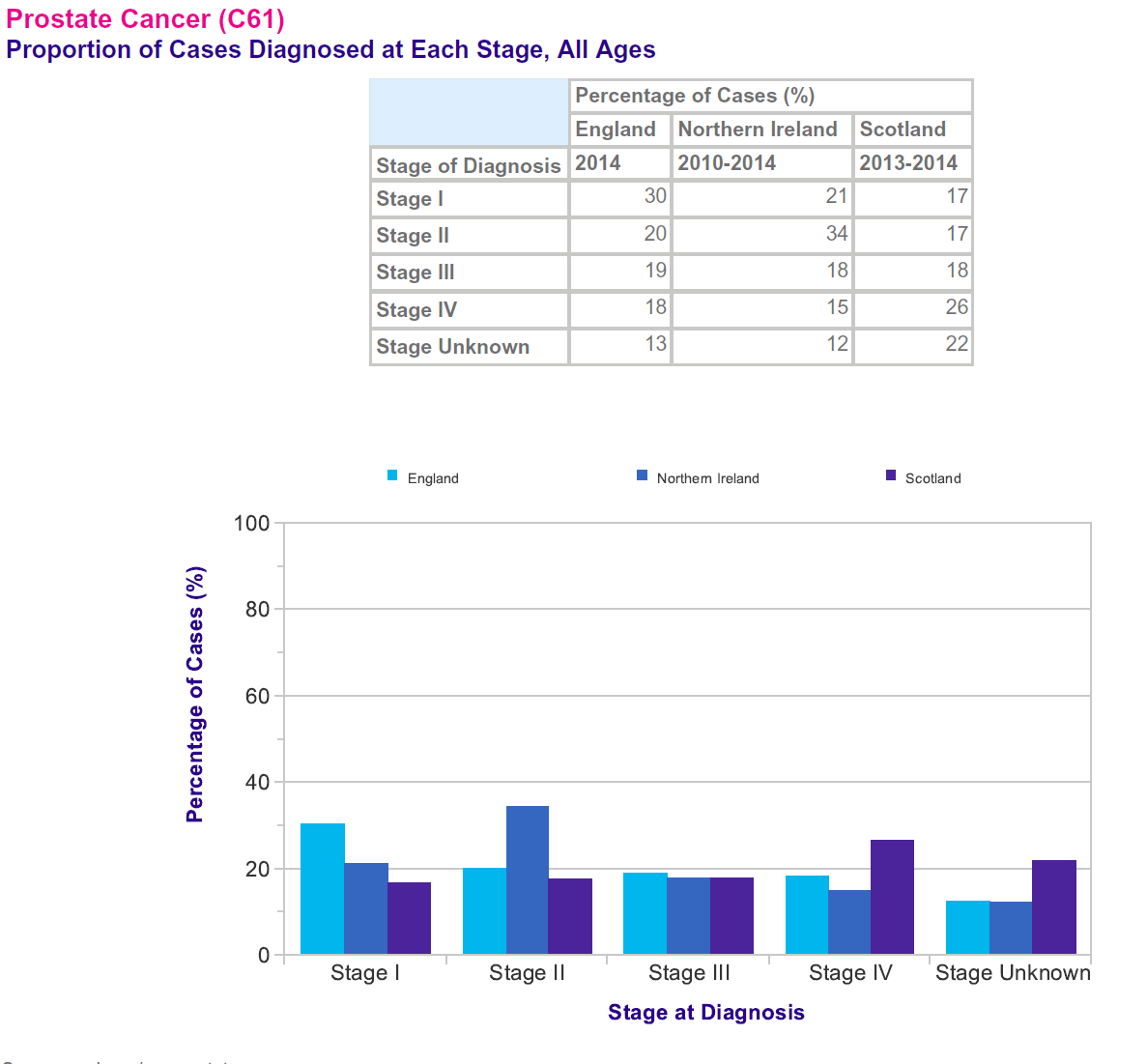prostatic carcinoma
Last edited 09/2023 and last reviewed 09/2023
Prostate carcinoma is considered to be a spectrum of diseases which may vary from slow growing tumours (which are often asymptomatic) to very aggressive tumours (1).
- it is the most common cancer in men in the UK
- is largely a disease of older men and is rare before 50 years (1)
- prostate cancer is the most common cancer in men and makes up 26%
of all male cancer diagnoses in the UK (2,3)
- prostate cancer is the most common cancer in men, and the second most
common cancer in the UK
- in 2014, there were over 46,000 new diagnoses of prostate cancer, which accounts for 13% of all new cancers diagnosed. About 1 in 8 men will get prostate cancer at some point in their life
- prostate cancer can also affect transgender women, as the prostate is usually conserved after gender-confirming surgery, but it is not clear how common it is in this population
- more than 50% of prostate cancer diagnoses in the UK each year are in men aged 70 years and over (2012), and the incidence rate is highest in men aged 90 years and over (2012 to 2014)
- out of every 10 prostate cancer cases, 4 are only diagnosed at a late stage in England (2014) and Northern Ireland (2010 to 2014)
- in the UK, a man's lifetime risk of being diagnosed with prostate cancer is 1 in 8 (4)
- study evidence revealed that:
- lifetime risk of being diagnosed with prostate cancer is approximately 1 in 8 for White men, 1 in 4 for Black men, and 1 in 13 for Asian men, whereas that of dying from prostate cancer is approximately 1 in 24 for White men, 1 in 12 for Black men, and 1 in 44 for Asian men
- study evidence revealed that:
- prostate cancer is the most common cancer in men, and the second most
common cancer in the UK
Prostate tumours can be divided into:
- localised prostate cancer
- the tumour is confined to the capsule of the gland
- grows slowly and usually remains asymptomatic (1)
- locally advanced prostate cancer
- cancers have extended outside the prostatic capsule
- frequently asymptomatic
- metastatic prostate cancer
- may be the first sign of prostate cancer
- frequently spreads to the bone and causes pain
- majority die due to the metastatic disease
- 5-year survival rate is approximately 30% (1)
UK stage at diagnosis (3):
- prostate cancer patients diagnosed with a known stage are most commonly diagnosed at stage I in England (35%), stage II in Northern Ireland (39%) and stage IV in Scotland (34%)
- more prostate cancer patients with a known stage are diagnosed at an early stage (57-63% diagnosed at stage I or II) than a late stage (37-43% diagnosed at stage III or IV) in England and Northern Ireland
- however, in Scotland more prostate cancer patients with a known stage are diagnosed at a late stage (44% diagnosed at stage III or IV) than an early stage (57% diagnosed at stage I or II)
- between 17% and 34% of prostate cancer patients have metastases at diagnosis (stage IV)

Fifteen-Year Outcomes after Monitoring, Surgery, or Radiotherapy for Prostate Cancer (5)
- UK RCT (n=1643) found similar prostate cancer mortality regardless of treatment (3.1% in active-monitoring group; 2.2% in prostatectomy group; 2.9% in radiotherapy group)
- for men on androgen deprivation therapy, clinical progression occurred in 25.9%, 10.5% & 11.0%, respectively
- authors concluded that the choice of therapy for men with localized prostate cancer involves weighing trade-offs between benefits and harms of treatment
The UK National Screening Committee recommends that screening programmes to detect prostate cancer should not be introduced at present in the UK. The Prostate Cancer Risk Management Programme was introduced in place of this with the aim of providing good quality information about the advantages and disadvantages of the PSA test.
Reference:
- (1) Prostate Cancer Risk Management Programme Information for primary care; PSA testing in asymptomatic men. Evidence document. NHS Cancer Screening Programmes, 2010
- (2) NICE (May 2019). Prostate cancer: diagnosis and treatment
- (3) CRUK. Prostate cancer statistics (Accessed 29/5/19)
- (4) Lloyd, T., Hounsome, L., Mehay, A. et al. Lifetime risk of being diagnosed with, or dying from, prostate cancer by major ethnic group in England 2008-2010. BMC Med 13, 171 (2015). https://doi.org/10.1186/s12916-015-0405-5
- (5) Hamdy FC et al.Fifteen-Year Outcomes after Monitoring, Surgery, or Radiotherapy for Prostate Cancer NEJM March 11th 2023.
management of prostatic carcinoma
urgent referral for suspected prostate cancer